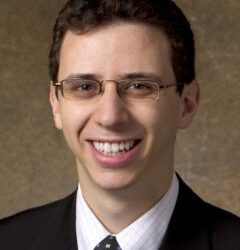When Chicago-area obstetrician-gynecologist Fabio Ortega pleaded guilty to sexually abusing two patients as they lay on his exam table, a reporter covering the case wondered how his abuse within a prominent health system was allowed to drag on.

“One of the things that struck me was that some of the women alleged (in lawsuits that) he assaulted them after the health system where he worked knew that he was under police investigation,” said Lisa Schencker, who writes about health care for the Chicago Tribune’s business desk.
In a four-part series, Schencker and Tribune investigative reporter Emily Hoerner showed how systemic problems such as gaps in state licensing oversight have enabled medical professionals accused of sexual misconduct to continue interacting with patients as usual, sometimes for years.
What findings stunned you the most?

Hoerner: It was surprising to see at different hospitals, at different health systems, that responses to patients’ sexual misconduct allegations ultimately kind of went nowhere, despite a patient’s bravery in coming forward to report an incident.
Schencker: I was also surprised by how many hospitals didn’t report the allegations of sexual misconduct to the state health department, as required by Illinois law, and how few consequences they faced for failing to do so. It surprised me that there didn’t seem to be any mechanism in state law to protect patients from doctors and others who are under active police investigations. Protections kick in only once a provider is criminally charged.
What was the biggest reporting challenge?
Hoerner: One of the biggest challenges was identifying instances where patients had alleged abuse by a health care provider and then figuring out a way to learn about the health system’s response. Health systems are generally private businesses or nonprofit organizations that don’t have to comply with the public’s requests for information.
What records did you find most useful?
Hoerner: As a reporter who isn’t normally dedicated to reporting on the health care beat, I wasn’t familiar with the investigations that the Illinois Department of Public Health conducts (sometimes on the behalf of the Centers for Medicare & Medicaid Services) into hospitals.
The records provided were absolutely fascinating; they gave us such an interesting look into hospital officials’ responses to patient allegations of abuse.
Police reports were also vital when patients went that route. We were able to see how officers built their case, including whom they alerted to their investigation at what point in time. The Illinois Department of Financial and Professional Regulation records were really important in understanding how discipline was meted out for health care workers who operate outside of hospital walls.
Schencker: On the flip side, as a reporter who isn’t normally dedicated to covering courts, I found many of the court documents to be very useful, in situations where women had filed lawsuits against providers. We got a lot of information from court hearing transcripts and interrogatories, in which lawyers, the defendant and the judge discussed health system documents and actions that we otherwise couldn’t access or confirm.
FOIA Requests
The reporters submitted FOIA requests for records of completed Illinois Department of Public Health investigations that found substantiated reports of patient abuse in medical settings, pursuant to the “patient protection from abuse” section of the Illinois Hospital Licensing Act.
Their request also returned some hospital inspection reports that resulted in a CMS Statement of Deficiency, also known as a 2567 form. Reporters can find lists of such deficiencies listed on this CMS website, with sexual abuse incidents described as a “patient rights” violation.
Editorial note: For several years, AHCJ has provided public access to the complete text of 2567 reports through its hospitalinspections.org website. AHCJ was forced to take hospitalinspections.org off line in January after major issues with CMS’s data were uncovered that could have misled journalists and readers. AHCJ has been negotiating with CMS to resolve the issues and get the site back online as soon as possible.
Some patients who experienced sexual abuse agreed to have their names used. Did that surprise you?
Hoerner: I worked on one other project that involved survivors of sexual abuse, so I came into this knowing that people have very different comfort levels about being named. What was really important was following best practices when dealing with sexual assault survivors and making sure the people we spoke with felt like they had some measure of control as they shared their stories with us. (She added that she generally refers to the Dart Center’s guidance, such as its tips for reporting on sexual violence and style guide for trauma-informed journalism.)
Schencker: The photographer on this project, Stacey Wescott, was also great at working with the survivors we interviewed to make sure they were comfortable with how they were photographed.
What questions should journalists ask about their own state professional licensing authorities?
Hoerner: I would ask about the agency’s role and limitations: What is this agency actually empowered to do? What types of action do state laws and administrative codes allow them to take? Can they work proactively? Do they rely on complaints from patients? Are they properly funded? Who, if anyone, is required to tell them that a health care worker has been fired for misconduct, accused of misconduct, charged with a crime, under investigation, etc.?
Your series includes a tip form to report abuse incidents. How many reader tips have you received? What additional reporting do you plan to do?
Hoerner: We received a little over a dozen responses so far from readers sharing their own stories or other information. We’re definitely keeping up with the potential legislation that the state agencies told us they were working on related to the issues we described, and we have a few other reporting avenues that we’re exploring. We’re also continuing to follow the cases against (Ortega). We’re definitely not done reporting on this topic.








